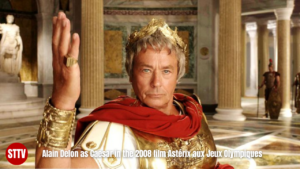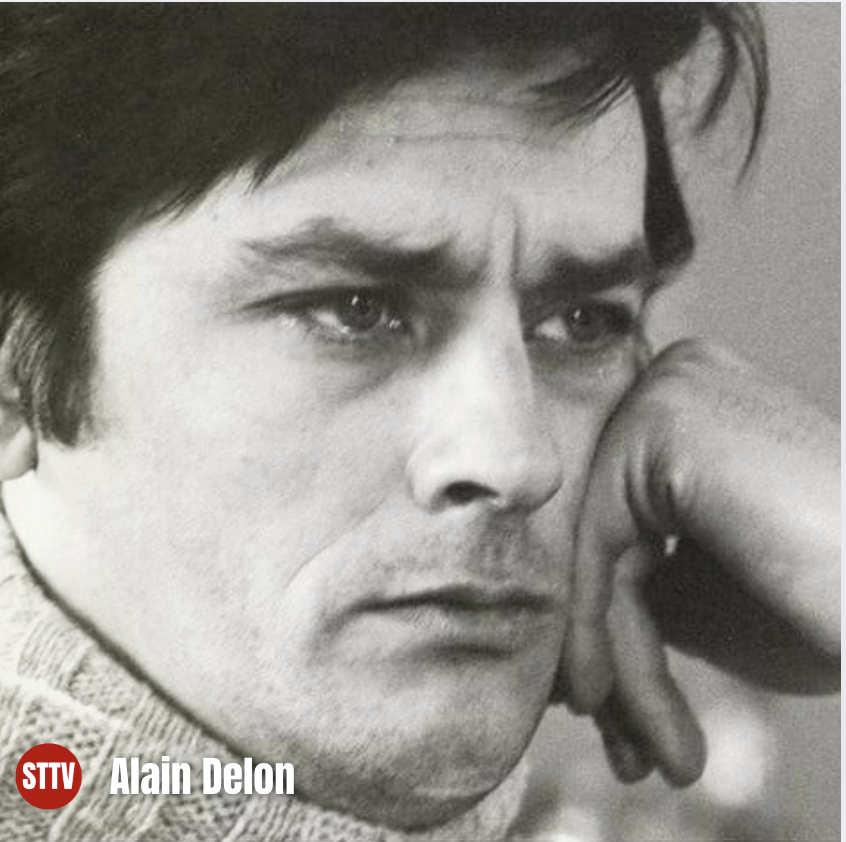And his independence was never forgiven. In 2019, when the Cannes Film Festival decided to award Delon an honorary Palme d’Or for his career achievements, a scandal broke out. The American group Women and Hollywood launched a petition against the award, accusing the actor of sexism, homophobia, and sympathizing with the right-wing.
Irony? A man who embodied masculinity in cinema, an Unparalleled Talent, became a persona non grata in 21st-century Hollywood.
Alain Delon passed away in 2024. And how did the Oscars and the César react in 2025? Not at all. No speech. No mention. Not a single second in the In Memoriam segment. A man who represented French cinema, a legend admired by audiences worldwide, was simply erased from the official memory of the film industry.
One cannot help but recall a scene from the film Asterix at the Olympic Games, where Delon, playing Julius Caesar, delivers his signature ironic line:
“He is a leopard. He is a samurai. He owes nothing to anyone—neither to Rocco and his brothers nor to the Sicilian clan… Caesar belongs to the race of rulers. And César for the best emperor… goes to César.”

It was a sarcastic jab at the César award, which he never received. But now, in retrospect, these words take on an even deeper meaning.
Delon was very skeptical of this award and even openly criticized it. In 2000, he refused an honorary César, stating: I don’t want to receive awards for what I did in the past. I want to be recognized for what I am doing now.
Alain Delon faced a great deal of hostility and bias in the industry. It was a mix of envy, political disagreements, and his own independence.
Delon was a mega-star of world cinema in the second half of the 20th century. He was not just an artist—he was an icon, recognized literally all over the world. Such a level of fame and success always breeds envy, especially among industry colleagues.
Moreover, he had unprecedented control over his career: he never once in his life auditioned for a role. Never. He starred in the best films, worked with the greatest directors (Luchino Visconti, Jean-Pierre Melville, Michelangelo Antonioni), and even produced films himself. Many believed he was too independent, meaning he did not conform to the system. And independence and absolute talent always irritate.
Delon never hid his views. He expressed admiration for General de Gaulle, supported law enforcement, and voiced his opinions publicly—without adjusting or being hypocritical. He loved his country; he was devoted to France.
When in 2019 he was supposed to receive an honorary Palme d’Or in Cannes, a scandal erupted. Left-wing activists and the group Women and Hollywood began accusing Delon of sexism, homophobia, and right-wing views, demanding that the award be canceled. The Cannes Festival still presented the award, but the atmosphere around him was tense.
And yet, Hollywood actors come to France for awards, dreaming of the Cannes Palme d’Or, the César, or the Berlin Golden Bear. Why then does Hollywood not celebrate European talents as generously?
Delon was always his own master. He never ingratiated himself with critics, never played by the rules of the global film elite, never tried to align himself with new political trends. This irritated many influential people in the industry.
He was too talented, too successful, too right-wing, too independent, too honest.
But in the eyes of millions of viewers, he will forever remain the same Delon—Rocco, the Samurai, the Black Tulip, the Man from Rio, Tancredi. And each of his roles deserved a higher award than the César.
These are not just awards for talent but a tool of internal industry politics. Many awards, especially in France and Hollywood, are given not only for outstanding acting but also for aligning with the spirit of the times. If a person has the wrong beliefs, they may simply be ignored. The film industry operates with clans, lobbyists, and PR agencies. Winners are often determined not by objective merit but by behind-the-scenes agreements.
In 2017, after a wave of feminist protests, Roman Polanski refused to be the chairman of the César jury due to public pressure. In 2020, the entire César Academy resigned after a scandal involving Polanski’s nomination for the film An Officer and a Spy.
This shows that awards have long been influenced not only by talent but also by who can and cannot be publicly supported.
Alain Delon was too great and talented to need recognition from all these awards. He was too free and independent, and therefore inconvenient. He did not play political games or conform to trends.
But he could not be ignored. He was noticed by millions of people who admired and will continue to admire him forever.
Cinema awards are politics, not just talent. If it were only about acting mastery, Delon would have received all the world’s awards long ago. But the film industry rewards not only the great but also the convenient. Delon, however, was too big a figure to bow to anyone. As a result, they simply decided not to notice him.

Delon’s true award is not the César, the Oscar, or the Palme d’Or. His true award is the millions of viewers who continue to love his films.
Admiring and remembering the Great Artist—Alain Delon.



